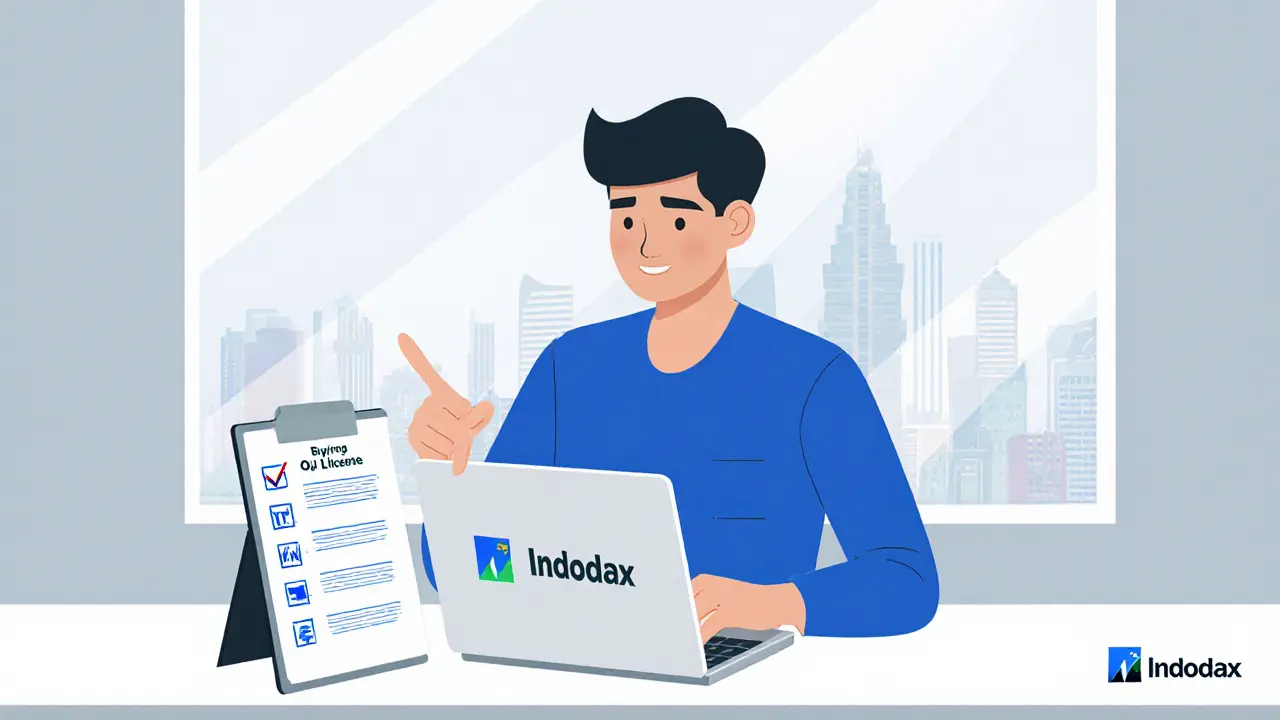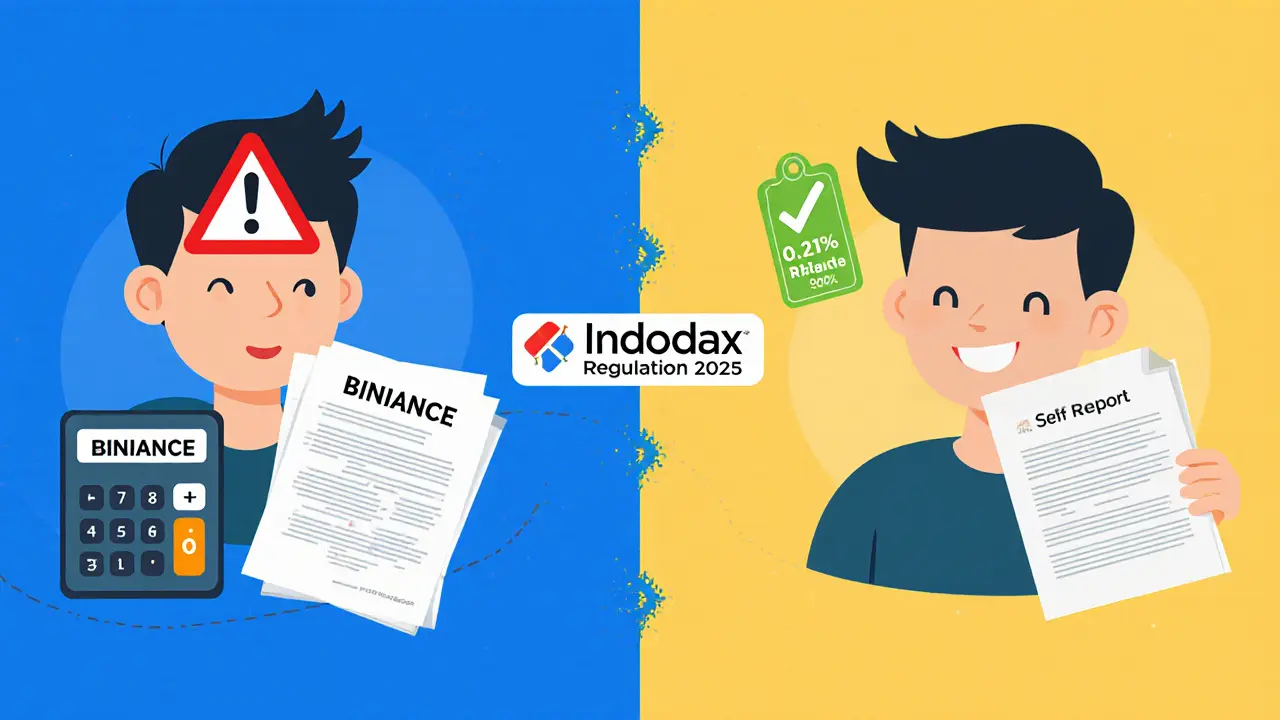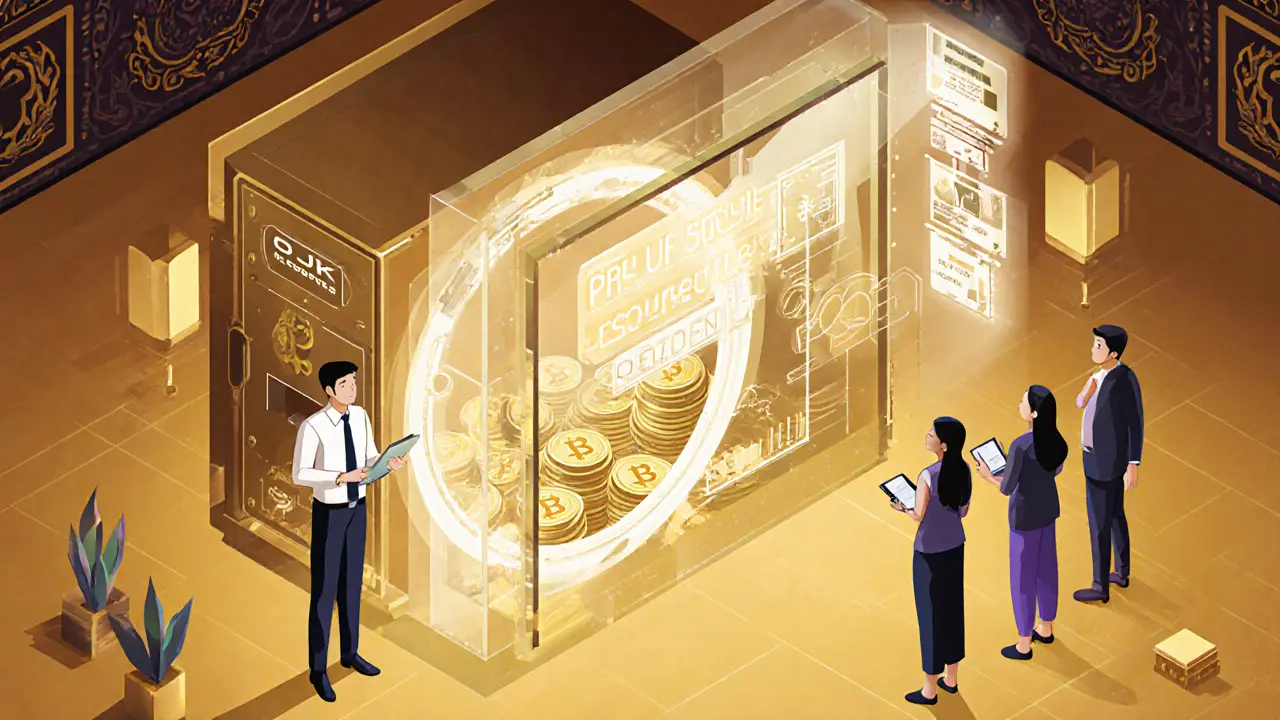
Crypto Tax Calculator
Calculate Your Crypto Tax
See the difference between trading on licensed Indonesian exchanges (0.21%) vs. foreign platforms (1%)
Tax Estimate
Indonesia doesn’t ban cryptocurrency - it just makes you play by strict rules. If you’re trading crypto here in 2025, you’re not breaking the law. But if you skip the steps, you could lose money, face fines, or even get your account frozen. The system is clear: crypto is an investment, not a payment method. You can buy, sell, and hold it. But you can’t use Bitcoin to pay for coffee, rent, or groceries. That’s illegal. And the government is watching.
Who’s in Charge Now? OJK Took Over in 2025
Before January 2025, the Commodity Futures Trading Regulatory Agency (BAPPEBTI) handled crypto rules. Now, it’s all under the Financial Services Authority, or OJK. This wasn’t just a name change. It meant crypto went from being treated like a commodity - similar to gold or soybeans - to being classified as a digital financial asset. That shift changed everything: how exchanges operate, how taxes are collected, and how users get verified. The OJK doesn’t just oversee banks and insurance companies anymore. It now runs the entire crypto ecosystem. All exchanges must be licensed under Regulation No. 27 of 2024. As of June 2025, only 22 platforms passed the test. Big names like Indodax, Tokocrypto, and Pintu are on the list. If you’re trading on anything else - even a platform that looks legit - you’re outside the law.The New Tax Rules: 0.21% vs. 1% - It’s a Big Difference
On August 1, 2025, the old crypto tax system died. Minister of Finance Regulation No. 50 of 2025 (PMK 50/2025) replaced everything. The biggest change? No more Value Added Tax (VAT). Crypto is no longer seen as a good you buy and sell. It’s treated like stocks or mutual funds. That means no 10% VAT. But now there’s a final Income Tax, and it depends on where you trade.- 0.21% - If you trade on an OJK-licensed exchange (like Indodax or Tokocrypto), this is your tax rate. It’s automatic. The exchange calculates and pays it for you.
- 1% - If you use a foreign exchange (like Binance, Kraken, or Coinbase), you’re on your own. You must report and pay this yourself. And yes, they know if you do. The OJK and tax office share data with foreign platforms through the National Single Window system.
How to Get Started: The 4-Step Legal Process
You can’t just sign up and start trading. The OJK requires a strict onboarding process. Here’s what you need to do:- Choose a licensed exchange - Go to ojk.go.id and check the official list. Don’t trust third-party blogs or Reddit posts.
- Submit your documents - National ID (KTP), Tax Identification Number (NPWP), and a selfie holding your ID. No exceptions. If your NPWP is expired, you won’t pass.
- Pass the financial literacy test - A 15-question quiz on crypto risks, volatility, scams, and how blockchain works. You need 80% to pass. Most people fail once. It’s not hard, but it’s designed to make you think before you invest.
- Link your bank account - Only Bank Indonesia-registered accounts work. You can’t use e-wallets like OVO or GoPay to deposit fiat. Must be a real bank account: BRI, BNI, Mandiri, Danamon, etc.

What Happens If You Use a Foreign Exchange?
Technically, you can still use Binance or Kraken. But you’re taking a risk. The OJK and Directorate General of Taxes (DGT) now monitor foreign transactions. If you make more than IDR 500 million (about $32,500) in a year, you’re flagged. You must file a self-report by March 31 each year using the e-Filing system. Many users don’t realize this is mandatory. A survey by Sanction Scanner found that 63.2% of Indonesians didn’t understand they had to report foreign trades. One trader in Jakarta lost $2,850 because he thought the 1% tax was optional. He didn’t file. The DGT sent a notice. He had to pay back taxes, penalties, and interest. Also, foreign exchanges don’t automatically withhold tax. You have to calculate it yourself. If you bought Bitcoin at $30,000 and sold at $40,000, your profit is $10,000. You owe 1% of that: $100. It sounds small, but if you trade often, it adds up. And if you get audited, you need records - every trade, every timestamp, every wallet address.The Hidden Costs: Slower Service, More Checks
There’s a trade-off for legality. Since the OJK took over, customer service has gotten slower. Indodax, the largest exchange, now has an average 3.8/5 rating on Trustpilot. The top complaints? Withdrawals taking 5+ days and support responses taking over 4 hours. Why? Because every transaction above IDR 500 million must be flagged and reviewed for money laundering. Every new user must be manually verified. Every withdrawal over IDR 100 million needs special OJK approval. It’s not bureaucracy for the sake of it. It’s designed to stop fraud and terrorist financing. But it frustrates users. One Reddit user wrote: “I had $5,000 in my account for 5 days because they needed a notarized letter from my bank. I didn’t even know that was a thing.”
Who’s Trading? The Real Users in Indonesia
As of June 2025, Indonesia has 14.3 million active crypto users - nearly 5% of the population. But it’s not evenly spread. Most are young: 68.3% are between 18 and 35. Most are men: 76.4%. And most live in Java - Jakarta, Bandung, Surabaya. The top three exchanges control 91% of the market:- Indodax: 47.2%
- Tokocrypto: 28.5%
- Pintu: 15.3%
What’s Coming Next? Two Big Changes in 2026
The rules aren’t done changing. Two major updates are on the horizon:- Proof-of-reserves audits - Starting January 1, 2026, every licensed exchange must prove they hold enough crypto to cover all user balances. No more “we lost it in a hack” excuses. This is meant to prevent another Terra/Luna collapse from wiping out Indonesian investors.
- Possible stablecoin payments - Bank Indonesia is quietly exploring whether to allow certain stablecoins (like USDT or BUSD) for cross-border remittances. Right now, sending money overseas via crypto is a gray zone. If approved, it could be a game-changer for overseas workers sending money home.
Is It Worth It?
Yes - if you follow the rules. Indonesia’s crypto market is one of the largest in Southeast Asia. The legal framework is clearer than in Thailand or the Philippines. The tax rate for local trades is low. The exchanges are secure. The government isn’t trying to crush crypto. It’s trying to control it. The real danger isn’t breaking the law. It’s not understanding it. People lose money not because crypto crashed - but because they didn’t know they had to file taxes, or they used an unlicensed platform and got locked out of their funds. Stick to OJK-licensed exchanges. Pay the 0.21%. Keep your records. Don’t assume foreign platforms are safer. And if you’re unsure? Call the OJK’s 24/7 hotline: +62 21 157 8900. It’s not perfect. But it’s the only legal path.Can I use Binance or Coinbase legally in Indonesia?
You can use foreign exchanges like Binance or Coinbase, but you’re not protected by Indonesian law. All profits from these platforms are taxable at 1% under PMK 50/2025, and you must report them yourself. If you trade over IDR 500 million annually, you’ll be flagged. Using them doesn’t break the law, but it increases your risk of penalties, audits, and lost funds if the platform freezes your account.
Do I need to pay tax if I just hold crypto and don’t sell?
No. You only pay tax when you sell, trade, or convert crypto into fiat (like Rupiah) or another digital asset. Holding Bitcoin, Ethereum, or any other coin without trading it doesn’t trigger a tax event. But you still need to keep records of your purchase price and date in case you sell later.
What happens if I don’t file my crypto taxes?
If you don’t report crypto income from foreign exchanges, the Directorate General of Taxes (DGT) can issue a tax assessment with penalties up to 100% of the unpaid amount, plus interest. In severe cases, they may freeze your bank accounts or block your NPWP. Many users have been caught because the OJK shares transaction data with the tax office. Don’t gamble - file even if you think you owe little.
Can I use crypto to pay for goods and services in Indonesia?
No. Under Bank Indonesia Regulation No. 20/6/PBI/2018 and the 2023 Payment Systems Law, the Rupiah is the only legal tender. Using Bitcoin, Ethereum, or any crypto to pay for coffee, rent, or online purchases is illegal. Even if a shop accepts it, they’re violating the law - and you could be held liable.
Are NFTs and DeFi allowed in Indonesia?
NFTs are not explicitly banned, but they’re in a gray zone. They’re not classified as financial assets yet, so they fall under the same rules as crypto - meaning you can trade them on licensed platforms and pay the 0.21% tax. DeFi (decentralized finance) platforms like Uniswap or Aave are not licensed by OJK. Using them carries high risk: no legal protection, no tax withholding, and no recourse if you lose funds. The government hasn’t banned them, but they’re not protected either.
How do I know if an exchange is really licensed?
Go to the official OJK website at ojk.go.id and check the list of licensed digital asset trading platforms. Do not rely on Google searches, YouTube ads, or Telegram groups. The list is updated monthly. If the exchange isn’t there, it’s not legal. Even if it has a local office or speaks Bahasa Indonesia, it’s not licensed unless it’s on that list.
Joy Whitenburg
13 11 25 / 17:00 PMI just started trading on Indodax last month and honestly? The 3-day wait for withdrawals is brutal, but at least I know my money isn't gonna vanish like on some sketchy site. 🤷♀️
Phil Bradley
14 11 25 / 01:07 AMYou know what’s wild? People still think Binance is ‘safer’-like the Indonesian government is some kind of crypto witch-hunter. Newsflash: they’re just trying to stop people from getting scammed. I’ve seen friends lose everything because they ignored the rules. Be smart, not lucky.
Diana Dodu
14 11 25 / 15:19 PMWhy do Americans always assume Indonesia is some lawless crypto jungle? We’re not Venezuela. We have rules, and guess what? They WORK. The fact that 14 million people are legally trading crypto here while the US is still arguing about whether it’s a commodity or a security? That’s called progress.
David Billesbach
16 11 25 / 06:55 AMOJK’s ‘proof-of-reserves’ mandate? That’s just the beginning. They’re laying the groundwork for a national digital currency. Mark my words-by 2027, your crypto wallet will be linked to your KTP, and every transaction tracked. This isn’t regulation. It’s surveillance with a smile.
Atheeth Akash
16 11 25 / 23:56 PMI use Pintu. Tax is automatic. Withdrawals take a week sometimes. But I sleep well at night. No drama. No stress. Just clean trades. This system? It’s not perfect-but it’s honest.
Stephanie Platis
17 11 25 / 19:43 PMLet’s be crystal-clear: if you’re using a foreign exchange and not filing your 1% tax, you’re not ‘being clever’-you’re committing tax fraud. And yes, the DGT has your data. They’re not bluffing. I’ve seen the notices. People are getting penalties. Don’t be the next headline.
Kylie Stavinoha
18 11 25 / 04:08 AMIt’s fascinating how Indonesia has turned crypto from a wild-west frontier into a regulated financial instrument-without crushing innovation. The 0.21% tax on licensed exchanges? That’s not a burden-it’s an incentive for trust. Compare that to the U.S., where crypto is either ignored or demonized. Here, they’re building something sustainable.
Michael Brooks
19 11 25 / 01:32 AMThe financial literacy test is actually pretty good. I failed it once because I thought ‘decentralization’ meant ‘no one can touch your coins.’ Turns out, it just means no central bank controls it. Big difference. Passed on the second try. Worth it.
Raymond Day
20 11 25 / 14:01 PMI just got flagged for $600k in annual trades on Binance… and now I’m being audited. They asked for every single wallet address I’ve ever used since 2020. I didn’t even remember half of them. 😭 Don’t be me. Stick to Indodax. Save your sanity.
James Ragin
22 11 25 / 01:04 AMYou think this is about taxes? Think again. The real goal is to control the population’s access to global capital. Once they own your wallet data, they can freeze your assets anytime. This isn’t financial reform-it’s economic control disguised as protection. And you’re all just signing up for it.
Wayne Dave Arceo
22 11 25 / 06:45 AMI don't care what you say. If you're not using Binance, you're not trading crypto-you're playing pretend. Indonesia's rules are archaic. The OJK is a bureaucratic joke. Real traders use decentralized platforms. Period.
Michelle Elizabeth
22 11 25 / 15:25 PMI used to think crypto was about freedom. Now I realize it’s about paperwork. My NPWP expired for two weeks-I couldn’t withdraw $200. I cried. Not because I lost money. Because I realized I’d traded autonomy for a 0.21% tax rate and a 7-day wait. We’re not investors. We’re compliance subjects.
Noriko Yashiro
23 11 25 / 13:36 PMHonestly? I’m just glad I can finally send money home to my family in Jakarta without paying 10% in fees. If stablecoins get approved for remittances? That’s the real win. Not the taxes. Not the exchanges. Just… helping people.